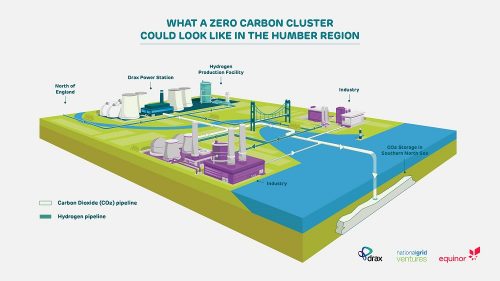Drax spearheads Humber hydrogen production facility

Drax Group, owners of the Selby power station, have signed up to a large-scale carbon capture usage and storage project which will see a hydrogen production facility built in the Humber.
It has signed a Memorandum of Understanding with Norwegian power company Equinor and National Grid Ventures for the new zero-carbon partnership. The facility could be constructed in the Humber in the mid-2020s.
The partnership says it is the first significant action from industry since the UK Committee on Climate Change recently published its Net Zero report, which found that carbon capture and storage and hydrogen technology developed in regional industrial clusters is “essential” to creating a zero-carbon economy by 2050.
The companies will work together to scale up bioenergy carbon capture and storage at Drax’s Selby Power Station to create the world’s first carbon negative power station in the 2020s and look at the development of a hydrogen demonstator.
Already, Drax Power Station captures a tonne of carbon dioxide per day from its innovative bioenergy carbon capture and storage (BECCS) pilot project, according to the group, and these plans will aid them in scaling up the scheme.
Will Gardiner, Drax Group CEO, said: “The Committee on Climate Change was clear – the UK needs both bioenergy with CCS and hydrogen production at scale by 2030 to achieve a ‘net zero’ carbon economy. This partnership is committed to meeting this challenge putting Great Britain at the heart of the global energy revolution.
“With Drax’s carbon negative power station, the Humber region could lead the world in new technologies that can deliver for the climate and the economy, helping to create a cleaner environment for future generations whilst creating new jobs and export opportunities for British businesses.”
Jon Butterworth, chief operating officer, Global Transmission, for National Grid Ventures, said: “We all agree that we must act now to start delivering a ‘net-zero’ carbon economy.
“That’s why we’re delighted to be working together with Equinor and Drax on a project of such great potential for the UK and the Humber region and leveraging our skills and expertise to enable this transition
“We have seen rapid progress in decarbonising energy through established technologies such as wind power, solar and electricity interconnectors.
”CCUS and hydrogen create a new pathway to greater decarbonisation of the energy system and provide the platform for decarbonising our other areas of our economy which will be to the benefit of current and future generations.”
A study outlining the technical, economic and societal opportunities for CCUS and hydrogen in the Humber region will be published by the partners later this year.








